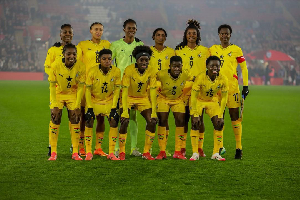Accra, Sept. 24, GNA - Over-concentration on HIV/AIDS could lead to the upsurge in the incidence of other diseases that could increase the mortality rate, Vice President Aliu Mahama cautioned on Wednesday. He, therefore, urged civil society groups, non-governmental organisations (NGOs) and other agencies to complement the government's efforts at reversing the rate of HIV/AIDS infections by investing in preventive, treatment and care programmes targeted particularly at the youth, females and the poor.
The Vice President was speaking at a ceremony in Accra at which he launched the Adventists Development Relief Agency's (ADRA) three-year HIV/AIDS/Prevention, Education and Services.
He said: "Funding remains critical, if we are to reduce the current level of HIV infections by half by the year 2015 as projected. "A lot more remains to be done including scaling up attention and commitment at all levels of society, mass social mobilisation and establishing a more supportive environment for those infected by HIV/AIDS."
Vice President Mahama, however, said that it was disturbing that the huge investments, time and resources so far invested in curbing the disease had reaped minimal benefits, with infection rates rather growing and spreading to almost every area.
"The Joint United Nations Programme on AIDS states that Ghana has a growing HIV/AIDS epidemic that could substantially erode the gains made in the social and economic fronts," he warned.
"The disease is reversing development gains, robbing millions of their lives and widening the gap between the rich and the poor. This is why AIDS prevention should be everybody's business."
The National AIDS Control Programme (NACP) puts the cumulative reported cases of AIDS from 1986 at 64,361 as at the end of last year. The national median prevalence is 3.4 per cent.
It was estimated that half a million people were living with the disease at the end of 2002.
The Vice President expressed concern that two out of every three reported cases were females and with the peak ages being between 25 and 34 years.
According to NACP, 80 per cent of the reported cases were between 15 and 49 years, which is the most productive and sexually active cohort of the population.
The implications of these statistics, the Vice President stressed, "are that not only is the cream of our society at risk of contracting HIV/AIDS but also the epidemic would soon devour the majority of our population if not halted."
Vice President Mahama said the gloomy picture, worsened by an expected population of 390,000 orphans by 2014; raised concern about the ability of the extended family and societal systems to manage the situation.
He, therefore, welcomed the intervention of ADRA, saying a multi-sectoral approach as championed by the government was the solution to the crises.
ADRA, with the support of the United States Department for Agriculture, is targeting 17,000 master craftsmen and their apprentices in addition to 3,000 long distance drivers and traders in five regions for education and treatment on sexually transmitted infections.
Under the 1.5 million dollar-programme, under the theme: HIV/AIDS Prevention: Everybody's Business," ADRA would use community-based behavioural change strategies, including drama, posters and interpersonal peer education to increase awareness, modify practices and change the attitude of the target groups.
The clients would also be referred to reproductive health facilities for counselling, diagnosis and treatment of STIs. Mr Jerry P. Lanier, Charge d'Affaires of the US Embassy, urged the private sector to participate in HIV/AIDS programmes by pasting appropriate campaign messages on their products.
He said the disease must be seen as a threat to the sustainability of industries as it could wipe out the labour force and undermine productivity.
Mr Lanier announced that the US government had increased its financial support to HIV/AIDS Control in Ghana from the annual 4.5 million dollars in previous years to seven million dollars this year.
General News of Wednesday, 24 September 2003
Source: GNA












